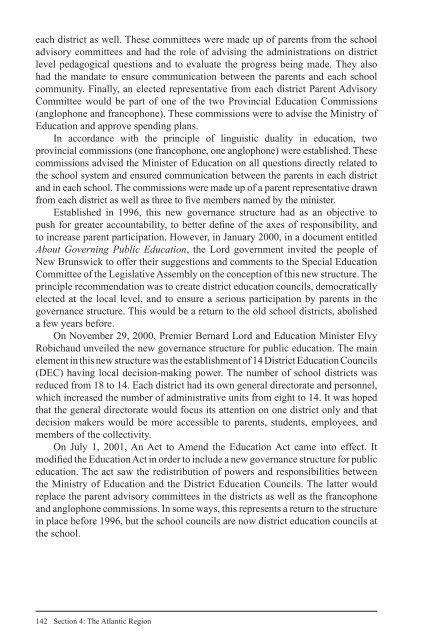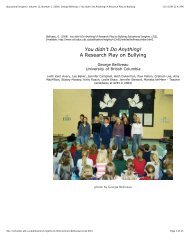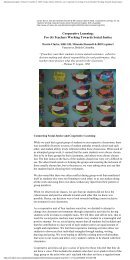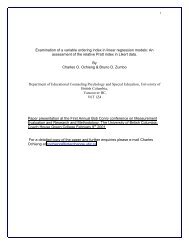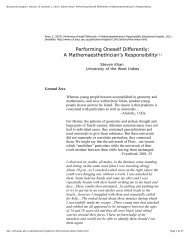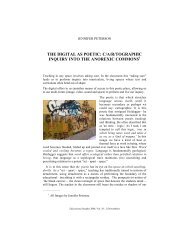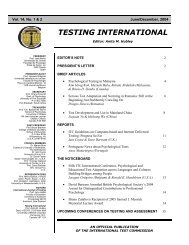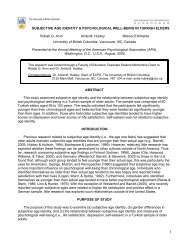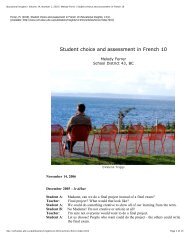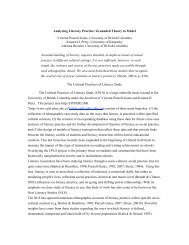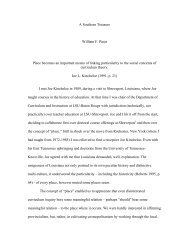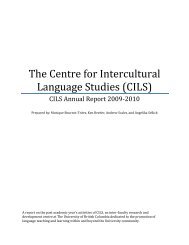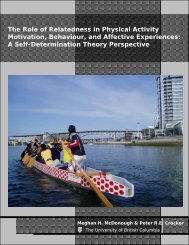The evolution of professionalism - Centre for Policy Studies in ...
The evolution of professionalism - Centre for Policy Studies in ...
The evolution of professionalism - Centre for Policy Studies in ...
Create successful ePaper yourself
Turn your PDF publications into a flip-book with our unique Google optimized e-Paper software.
each district as well. <strong>The</strong>se committees were made up <strong>of</strong> parents from the school<br />
advisory committees and had the role <strong>of</strong> advis<strong>in</strong>g the adm<strong>in</strong>istrations on district<br />
level pedagogical questions and to evaluate the progress be<strong>in</strong>g made. <strong>The</strong>y also<br />
had the mandate to ensure communication between the parents and each school<br />
community. F<strong>in</strong>ally, an elected representative from each district Parent Advisory<br />
Committee would be part <strong>of</strong> one <strong>of</strong> the two Prov<strong>in</strong>cial Education Commissions<br />
(anglophone and francophone). <strong>The</strong>se commissions were to advise the M<strong>in</strong>istry <strong>of</strong><br />
Education and approve spend<strong>in</strong>g plans.<br />
In accordance with the pr<strong>in</strong>ciple <strong>of</strong> l<strong>in</strong>guistic duality <strong>in</strong> education, two<br />
prov<strong>in</strong>cial commissions (one francophone, one anglophone) were established. <strong>The</strong>se<br />
commissions advised the M<strong>in</strong>ister <strong>of</strong> Education on all questions directly related to<br />
the school system and ensured communication between the parents <strong>in</strong> each district<br />
and <strong>in</strong> each school. <strong>The</strong> commissions were made up <strong>of</strong> a parent representative drawn<br />
from each district as well as three to fi ve members named by the m<strong>in</strong>ister.<br />
Established <strong>in</strong> 1996, this new governance structure had as an objective to<br />
push <strong>for</strong> greater accountability, to better defi ne <strong>of</strong> the axes <strong>of</strong> responsibility, and<br />
to <strong>in</strong>crease parent participation. However, <strong>in</strong> January 2000, <strong>in</strong> a document entitled<br />
About Govern<strong>in</strong>g Public Education, the Lord government <strong>in</strong>vited the people <strong>of</strong><br />
New Brunswick to <strong>of</strong>fer their suggestions and comments to the Special Education<br />
Committee <strong>of</strong> the Legislative Assembly on the conception <strong>of</strong> this new structure. <strong>The</strong><br />
pr<strong>in</strong>ciple recommendation was to create district education councils, democratically<br />
elected at the local level, and to ensure a serious participation by parents <strong>in</strong> the<br />
governance structure. This would be a return to the old school districts, abolished<br />
a few years be<strong>for</strong>e.<br />
On November 29, 2000, Premier Bernard Lord and Education M<strong>in</strong>ister Elvy<br />
Robichaud unveiled the new governance structure <strong>for</strong> public education. <strong>The</strong> ma<strong>in</strong><br />
element <strong>in</strong> this new structure was the establishment <strong>of</strong> 14 District Education Councils<br />
(DEC) hav<strong>in</strong>g local decision-mak<strong>in</strong>g power. <strong>The</strong> number <strong>of</strong> school districts was<br />
reduced from 18 to 14. Each district had its own general directorate and personnel,<br />
which <strong>in</strong>creased the number <strong>of</strong> adm<strong>in</strong>istrative units from eight to 14. It was hoped<br />
that the general directorate would focus its attention on one district only and that<br />
decision makers would be more accessible to parents, students, employees, and<br />
members <strong>of</strong> the collectivity.<br />
On July 1, 2001, An Act to Amend the Education Act came <strong>in</strong>to effect. It<br />
modifi ed the Education Act <strong>in</strong> order to <strong>in</strong>clude a new governance structure <strong>for</strong> public<br />
education. <strong>The</strong> act saw the redistribution <strong>of</strong> powers and responsibilities between<br />
the M<strong>in</strong>istry <strong>of</strong> Education and the District Education Councils. <strong>The</strong> latter would<br />
replace the parent advisory committees <strong>in</strong> the districts as well as the francophone<br />
and anglophone commissions. In some ways, this represents a return to the structure<br />
<strong>in</strong> place be<strong>for</strong>e 1996, but the school councils are now district education councils at<br />
the school.<br />
142 Section 4: <strong>The</strong> Atlantic Region


